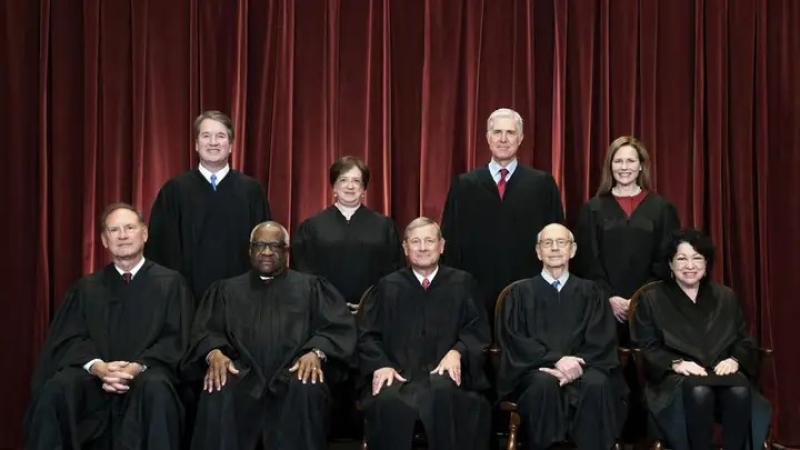One more blockbuster Supreme Court decision could still be coming even after Friday's abortion ruling
By: Liz Peek (Fox News)


The Fat Lady hasn't sung yet. SCOTUS overturning Roe v. Wade may have been a seismic shift in enforcing the Constitutional intent of decentralized government. But the SCOTUS decision in the West Virginia v. EPA case could be tectonic for enforcing the Constitutional intent of responsibility and obligation for governing.
A SCOTUS decision siding with West Virginia would dramatically limit the ability of the court to legislate from the bench. So, we'll see.

Believe it or not, overturning Roe v. Wade may not be the Supreme Court's most dramatic decision this year. Instead, its ruling on West Virginia v. the Environmental Protection Agency could prove far more consequential. It could literally upend how our government works.
For the better.
West Virginia vs. the EPA asks whether important policies that impact the lives of all Americans should be made by unelected D.C. bureaucrats or by Congress. This SCOTUS could well decide that ruling by executive agency fiat is no longer acceptable.
The case involves the Clean Power Plan, which was adopted under President Barack Obama to fight climate change; the program was estimated to cost as much as $33 billion per year and would have completely reordered our nation's power grid. The state of West Virginia, joined by two coal companies and others, sued the EPA, arguing the plan was an abuse of power.
By deciding in favor of West Virginia, the court could begin to rein in the vast powers of the alphabet agencies in D.C. that run our lives and return it to legislators whom we elect to create…legislation. Just as the Supreme Court ruled in Roe v. Wade that abortion laws are more appropriately left up to the people's elected representatives, it may decide in West Virginia vs. EPA that Congress, and not federal agencies, should write our laws.
A decision that puts Congress in charge would stall environmental rules intended to replace fossil fuels with renewable energy. Legislators, back in the driver's seat, would have to debate and go public with the consequences - and costs -- of regulations that are now adopted with little buy-in from the public.
To further their climate agenda, Democrats have been able to hide the full-in price tag of abandoning oil and gas as our main energy sources by creating tax subsidies for renewables. If consumers had to pay the real cost of wind and solar power, they might not be so enthusiastic about what President Joe Biden calls the great "transition."
But the case goes beyond environmental regulations.
A ruling in favor of West Virginia would reverse a decades-long trend in which Congress has handed off to federal agencies decisions our legislators refuse or are unable to make. The usurping of authority by D.C. bureaucracies began with the New Deal in the 1930s, when an ambitious President Franklin D. Roosevelt led the way by creating the TVA, the WPA and a total of 69 other offices and executive branch agencies to do his bidding. The process occasioned Democrat Al Smith to complain that he was "submerged in a bowl of alphabet soup."
Restricting the power of the alphabet soup authorities might require that our representatives and senators actually do their jobs, allowing less time for posturing and passing pointless dead-on-arrival bills. They might have to show up more than half the days in the year, for instance, which is the current norm.
It could, for sure, derail the ambitions of Joe Biden, who won no significant majority in Congress and appears incapable of "working across the aisle," though as Candidate Biden, he argued that ability was one of his strongest credentials.
In addition to broad environmental rules that might come under new scrutiny, subsequent suits might challenge labor laws written by the NLRB, consumer protection edicts from the CFPB, and regulations put in place by the FDA, the CDC and the entire host of agencies that have immense - many would say excess - power over our lives.
But initially, the ruling would deep-six the Biden administration's ambition to kill off the coal industry, which is why West Virginia, our nation's second biggest coal-mining state after Wyoming, brought the suit, along with Westmoreland Mining Holdings, North American Coal Corporation and others.
Like Obama, Biden wants to effectively shut down our fossil fuel industries that provide cheap, plentiful and reliable energy and that are the envy of the world. His "Build Back Better" plan incorporated $550 billion in programs aimed at curtailing emissions, including significant portions of Bernie Sanders' Green New Deal.
Rep. Alexandria Ocasio-Cortez is joined on stage by Sen. Bernie Sanders during the Climate Crisis Summit at Drake University on Nov. 9, 2019 in Des Moines, Iowa. (Stephen Maturen/Getty Images)
Obama's approach was to reinterpret the 1970 Clean Air Act to allow a nationwide cap-and-trade regimen, requiring power plants to offset emissions by investing in other low-carbon facilities. Congress did not alter the Clean Air Act language to permit the Clean Power Plan; the Obama White House simply grabbed it as a way to further their climate ambitions.
The courts decided the CPP constituted executive overreach and put the plan on hold. Subsequently, the Trump White House rescinded the program.
This back-and-forth highlights an obvious problem with government by alphabet soup. Successive administrations can easily change the rules by which such agencies operate. Policymaking ; therefore, is erratic and inconsistent. Especially in the power arena, where new facilities can take years to build and the impact on the general population can be profound, this is a costly and inefficient way to govern.
Political parties rise and fall, to be sure, and can also change the nation's direction. But matters of consequence should be argued in the public forum and not buried under the almost 100,000 pages of new rules and regulations published during Obama's last year in office, for instance.
Supreme Court Justice Antonin Scalia once wrote in a decision, "We expect Congress to speak clearly if it wishes to assign to an agency decisions of vast 'economic and political significance." That limiting guidance appears to have support from the conservative justices on the court today.
If the court launches a widespread curtailment of governing by executive agency, as it should, we will see more protests and renewed cries to "Pack the Court," including from members of Congress. After all, they'll have to get to work.

Tags
Who is online
459 visitors


Dobbs v. Jackson rocked Democrats' boat. West Virginia v. EPA could sink Democrats' boat.
It's going to be a difficult transition for the two parties accustomed to doing nothing. Imagine legislators having to actually legislate. Imagine a President not being able to pin their hopes (and legacy) on a politically compliant court. The shift in politics would be tectonic.
The US Constitution creates a very centralized government. Who told you otherwise? That centralization and federal power is why the previous and federally weaker Articles of Confederation were scrapped after only a decade because that weakness of the federal government made the country ungovernable. We are not 50 separate and independent states like the EU. Where do you get this nonsense?
Were you not paying attention in history class during the Civil war and the repercussions of Appomattox Courthouse?
Which has what to do again with the executive branch over reach; and a bunch of unelected government officials being able to make up laws as they go along?
The Tenth Amendment also states:
Don't believe an over reach by Obama or Biden using the EPA to achieve what Congress will not allow is legal.
And, yet, there is a 10th Amendment.
The Constitution created a decentralized government that was required to share governing authority. That's why all elections (including Presidential elections) are conducted by states according to laws enacted by each state. That's also why each state has its own Constitution; the Federal Constitution isn't the only one. The Federal Constitution requires the Federal government to accept and comply with the results of state elections. Elected Federal officials do not represent the Federal government.
The United States is a republic of separate, independent, sovereign states. That's what the name 'United States' means. We aren't the Federal Republic of America; we are the United States of America.
The 10th was rendered almost irrelevant by the civil war.
Lol.
Really?
Then it is time for the Supreme Court to fix that with this ruling.
That would have both parties shitting bricks. They would have to actually work for that bloated salary.
It would be nice for the country. But maybe that's why the rely so much on the courts. When was the last time anything was done for the PEOPLE and not the politicians?
It will be handed down tomorrow... I suspect tomorrow will be a busy day for this site as well. Hope the server can handle the load.. hehe
And the ruling of West Virginia v. EPA is in.
Hoo boy... Congress is gonna have to start doing their own work rather than continue to pass the buck to an agency. About damn time. Maybe we can get back to the days when politicians worked for the good of the people and the country. yeah, I know, dreaming an all....
Yep. They don't want the accountability.
Another strong win for our democratic processes.
The radicals on both sides are going to hate this!
Hopefully this will get them all voted out of office.
Somebody's pet projects are about to be cancelled!!!!!!
The ruling also curbs the cycle of issuing a regulation followed by court challenges that has resulted in legislating from the bench. That cycle has expanded the authority of bureaucracies beyond the intent of authorizing legislation. In essence, the executive branch and judicial branch have teamed up to bypass Congress.
Ultimately the ruling threatens the Congressional practice of enacting omnibus legislation which has contributed to gridlock. IMO Congress bears the most blame for how the intent of the Constitution has been degraded. Congress has adopted rules and practices that deliberately cause gridlock.
While the press (and Congressional politicians) will likely frame this decision as a limit on executive overreach, the ruling is actually castigating Congress for not doing its job.